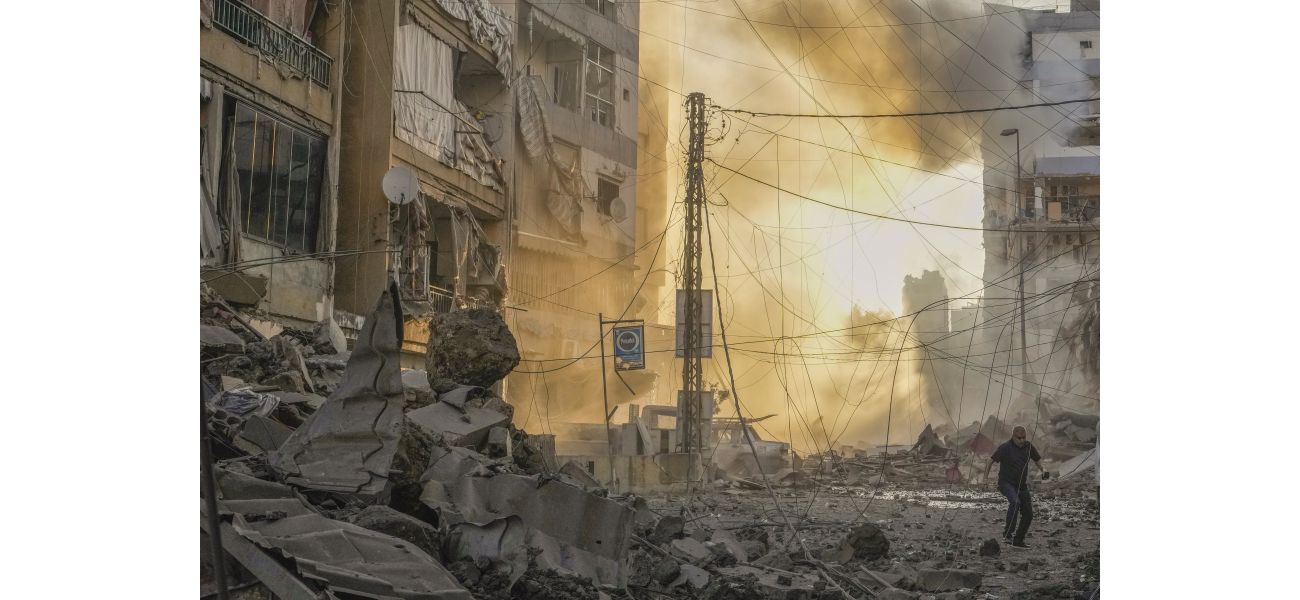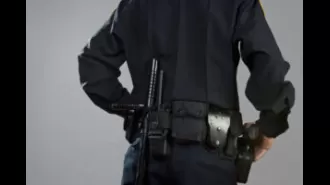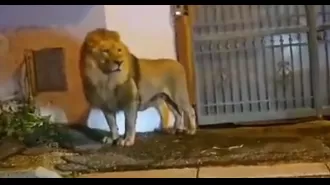Bombings in Beirut disrupt travel to Syria and cause panic among residents.
Israel conducted airstrikes on Beirut suburbs, disrupting travel at main border crossing, as thousands fled the bombardment.
October 4th 2024.

Israel has carried out a series of airstrikes overnight, targeting suburbs of Beirut and the main border crossing between Lebanon and Syria. These attacks have caused chaos and destruction, forcing tens of thousands of people to flee their homes to escape the bombardment.
The explosions in Beirut's southern suburbs were so powerful that they could be seen and felt kilometers away in the Lebanese capital. The Israeli military has not revealed the intended target of these airstrikes and there is no information yet available on any casualties. However, Lebanon's state-run National News Agency has reported more than 10 consecutive airstrikes in the area.
At the same time, Israel's military has reported that Hezbollah launched about 100 rockets into Israel on Friday, as the fighting between the two sides continues. In addition, the Israeli military has also confirmed that a strike in Beirut the day before killed Mohammed Rashid Skafi, the head of Hezbollah's communications division. The military has stated that Skafi was a senior terrorist and closely affiliated with high-ranking Hezbollah officials.
The strike along the Lebanon-Syria border on Thursday, which is about 50 kilometers east of Beirut, has resulted in the closure of the road near the Masnaa Border Crossing. According to Israel, this crossing was targeted because it was being used by Hezbollah to transport military equipment from Iran and other allies into Lebanon. The fighter jets struck a tunnel that was being used to smuggle weapons, as Hezbollah is known to receive much of its weaponry from Iran via Syria. The group has a presence on both sides of the border and has been fighting alongside Syrian President Bashar Assad's forces in the region.
Video footage from the Associated Press has shown the aftermath of the strike, with two huge craters on each side of the road. People have been forced to leave their cars and cross on foot, carrying their belongings with them. This has added to the already dire situation in Lebanon, where tens of thousands of people have been fleeing the war and crossing into Syria over the past two weeks.
These latest airstrikes come after Israel warned people living in southern Lebanon to evacuate, including areas beyond the buffer zone declared by the United Nations after the 2006 war between Israel and Hezbollah. The Israeli military has also launched a ground incursion into Lebanon, resulting in clashes with Hezbollah militants along the border. Before the incursion, a series of attacks had already killed some of the group's key members, including longtime leader Hassan Nasrallah.
Meanwhile, Iranian Foreign Minister Abbas Araghchi has arrived in Beirut for meetings with Lebanese officials. He has warned that if Israel attacks Iran, Tehran will retaliate in a harsh manner. Iran is the main supporter of Hezbollah and has provided the group with weapons and billions of dollars over the years. In Tehran, Iran's Supreme Leader Ayatollah Ali Khamenei has praised the country's recent missile strike on Israel and stated that Iran is prepared to carry out more strikes if necessary.
Araghchi's visit to Beirut comes after Iran launched over 180 missiles into Israel, escalating the conflict and bringing the Middle East closer to a regionwide war. Khamenei delivered a speech at the main prayer site in Tehran, where he spoke about the recent events and expressed support for Palestine, with a huge Palestinian flag decorating the mosque.
The strike on the main border crossing is the first time it has been cut since the beginning of the war. According to the Lebanese General Security, over 250,000 Syrian citizens and 82,000 Lebanese citizens have crossed into Syrian territory since September 23, when Israel began its heavy bombardment of southern and eastern Lebanon. While most of the border crossings remain open, the Lebanese minister of public works has stated that they all operate under the supervision of the state.
The violence in the Israeli-occupied territory has escalated since the Israel-Hamas war erupted in October 2023. Cities in the north, including Tulkarem, have seen some of the worst violence. In response to the attack by Hamas, Israel declared war on the group in the Gaza Strip. Since then, over 41,000 Palestinians have been killed, with more than half of them being women and children. In Lebanon, nearly 2000 people have been killed since September 23, according to the Lebanese Health Ministry.
On Friday, Israel's military reported that two rockets were fired into Israeli territory from Gaza, the first time this has happened in about a month. One of the rockets was intercepted by Israel's Iron Dome defense system, while the other fell in an open area near a kibbutz across the border from Gaza. The number of rockets being fired into Israel has decreased significantly since the start of the war.
The explosions in Beirut's southern suburbs were so powerful that they could be seen and felt kilometers away in the Lebanese capital. The Israeli military has not revealed the intended target of these airstrikes and there is no information yet available on any casualties. However, Lebanon's state-run National News Agency has reported more than 10 consecutive airstrikes in the area.
At the same time, Israel's military has reported that Hezbollah launched about 100 rockets into Israel on Friday, as the fighting between the two sides continues. In addition, the Israeli military has also confirmed that a strike in Beirut the day before killed Mohammed Rashid Skafi, the head of Hezbollah's communications division. The military has stated that Skafi was a senior terrorist and closely affiliated with high-ranking Hezbollah officials.
The strike along the Lebanon-Syria border on Thursday, which is about 50 kilometers east of Beirut, has resulted in the closure of the road near the Masnaa Border Crossing. According to Israel, this crossing was targeted because it was being used by Hezbollah to transport military equipment from Iran and other allies into Lebanon. The fighter jets struck a tunnel that was being used to smuggle weapons, as Hezbollah is known to receive much of its weaponry from Iran via Syria. The group has a presence on both sides of the border and has been fighting alongside Syrian President Bashar Assad's forces in the region.
Video footage from the Associated Press has shown the aftermath of the strike, with two huge craters on each side of the road. People have been forced to leave their cars and cross on foot, carrying their belongings with them. This has added to the already dire situation in Lebanon, where tens of thousands of people have been fleeing the war and crossing into Syria over the past two weeks.
These latest airstrikes come after Israel warned people living in southern Lebanon to evacuate, including areas beyond the buffer zone declared by the United Nations after the 2006 war between Israel and Hezbollah. The Israeli military has also launched a ground incursion into Lebanon, resulting in clashes with Hezbollah militants along the border. Before the incursion, a series of attacks had already killed some of the group's key members, including longtime leader Hassan Nasrallah.
Meanwhile, Iranian Foreign Minister Abbas Araghchi has arrived in Beirut for meetings with Lebanese officials. He has warned that if Israel attacks Iran, Tehran will retaliate in a harsh manner. Iran is the main supporter of Hezbollah and has provided the group with weapons and billions of dollars over the years. In Tehran, Iran's Supreme Leader Ayatollah Ali Khamenei has praised the country's recent missile strike on Israel and stated that Iran is prepared to carry out more strikes if necessary.
Araghchi's visit to Beirut comes after Iran launched over 180 missiles into Israel, escalating the conflict and bringing the Middle East closer to a regionwide war. Khamenei delivered a speech at the main prayer site in Tehran, where he spoke about the recent events and expressed support for Palestine, with a huge Palestinian flag decorating the mosque.
The strike on the main border crossing is the first time it has been cut since the beginning of the war. According to the Lebanese General Security, over 250,000 Syrian citizens and 82,000 Lebanese citizens have crossed into Syrian territory since September 23, when Israel began its heavy bombardment of southern and eastern Lebanon. While most of the border crossings remain open, the Lebanese minister of public works has stated that they all operate under the supervision of the state.
The violence in the Israeli-occupied territory has escalated since the Israel-Hamas war erupted in October 2023. Cities in the north, including Tulkarem, have seen some of the worst violence. In response to the attack by Hamas, Israel declared war on the group in the Gaza Strip. Since then, over 41,000 Palestinians have been killed, with more than half of them being women and children. In Lebanon, nearly 2000 people have been killed since September 23, according to the Lebanese Health Ministry.
On Friday, Israel's military reported that two rockets were fired into Israeli territory from Gaza, the first time this has happened in about a month. One of the rockets was intercepted by Israel's Iron Dome defense system, while the other fell in an open area near a kibbutz across the border from Gaza. The number of rockets being fired into Israel has decreased significantly since the start of the war.
[This article has been trending online recently and has been generated with AI. Your feed is customized.]
[Generative AI is experimental.]
0
0
Submit Comment





